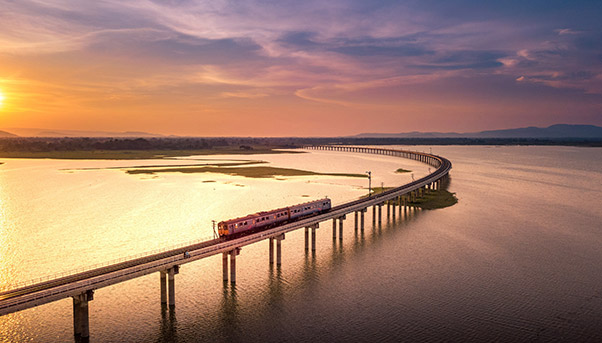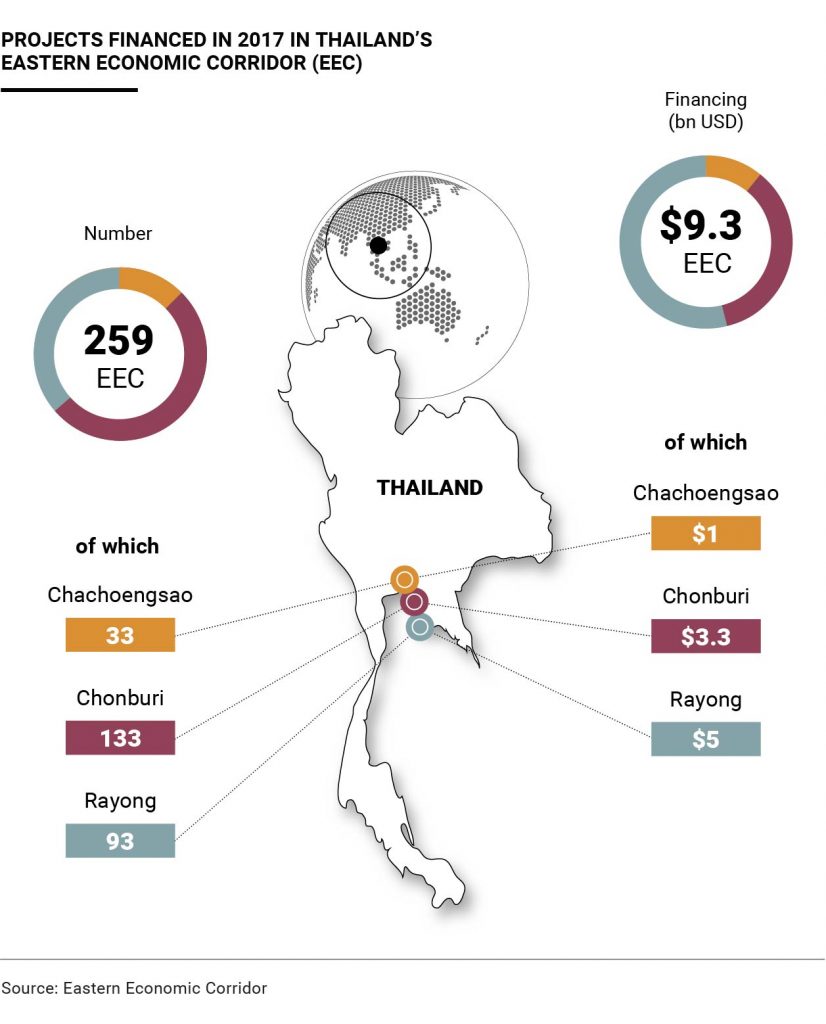
An ambitious investment program that aims to transform a large part of Thailand into one of South-East Asia’s leading industrial hubs is becoming a reality. A few weeks ago, Thailand’s parliament approved a package of legislation and fiscal reforms needed to support infrastructure spending along the new Eastern Economic Corridor (EEC) and help attract foreign investors and companies. With this project – which first got under way in 2017 – South-East Asia’s second-largest economy aims to make trade more efficient, encourage investment and transform the region into an innovation cluster. To reach this aim, the government has budgeted $45 billion in investments for the coming years, enough to complete the Eastern Economic Corridor, a strip of land along the coast connected to the capital by modern and efficient infrastructure, and populated with innovative companies.
According to the Thailand Investment Agency, the program raised $9.3 billion in 2017, but this is just the starting point of the overall plan approved in recent weeks. The money comes from private investors, and not from the state. This is probably the most significant aspect of the EEC, because the strength of the plan will be in the ability to attract private investment, guaranteed by a series of reforms which is transforming the country into a more attractive business destination.
A country serious about attracting foreign investment
The EEC will succeed or fail based on its ability to attract private investment. That is why Thailand’s government, and now parliament, has accompanied the plan with a series of reforms, fiscal and non, that guarantee incentives to companies that decide to invest in the project.
Among these reforms are fiscal benefits, long-term work permits for business stays, and financing for companies that decide to move their headquarters to the EEC. Moreover, the government’s plan also lets participants rent out designated industrial areas for 99 years, as well as reforms that slash red tape for anyone who wants to open up a business inside the EEC.

An industrial wonderland
The area selected by the Thai government for the EEC covers the provinces of Rayong, Chonburi and Chachoengsao near Bangkok and – according to the project – should be transformed in a few years into one of Asia’s top hubs for business, investments and logistics.
The goal is to attract technology companies, but also research centres and universities that will help spread a culture of innovation. The first step on this long road is to become equipped with an efficient infrastructure. Leading the way among projects already launched is the new U-Tapao International Airport, and also a new $7.2-billion high-speed train that will connect the new airport to the two existing ones serving Bangkok. According to Nattaporn Jatusripitak, an advisor to Prime Minister Nayok Ratthamontri, this project will also be financed using a public-private formula. The agreement has already been signed, laying out a 50-year contract: the first five years are taken up by construction, and the remaining 45 for operational management. Once completed, the train – travelling at speeds of up to 250 kilometres per hour – will serve the EEC with five stations in the main provinces, giving a strong push to the urban development of the area.
A multiplier for Thailand’s economy
Thailand’s government is betting heavily on the EEC, which it sees as a fundamental engine for the country’s economic growth. In January, Thailand’s largest chemical group PTT Global Chemical said it was investing $985 million to open a factory in the EEC. The Amata Corporation, Thailand’s top industrial real estate developer, said revenue from land sales and rent rose 47% in 2017, mainly from the EEC, while automotive giants Toyota, Honda and Ford are already present in the area, which weekly news publication The Economist once called “The Detroit of the East”.
The government hopes the EEC investment plan will support foreign direct investment, which in 2018 should increase by 4.2%. The World Bank highlighted this trend when it said last year in its Doing Business 2018 report that Thailand moved up to 26th place out of 190 countries from 47th place the previous year. This move up the ranks netted Thailand a place in the top 10 countries that have improved most in the ease of doing business in the past year. Thailand is positioned to become a reference market for South-East Asia.


